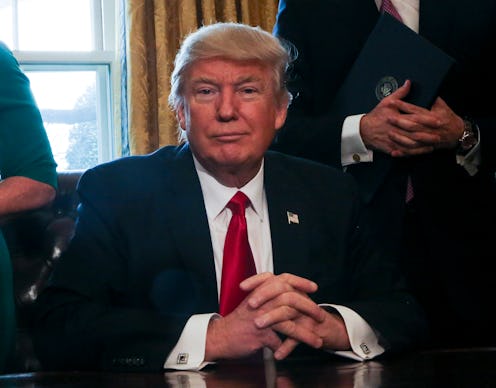News
This Report On Trump's Businesses Will Concern You

In the run-up to the inauguration of President Donald Trump, there were countless potential issues and violations of longstanding norms being hashed out, perhaps foremost among them Trump's ownership of a world-spanning business empire. The massive size and scale of the Trump Organization, especially insofar as it included top-dollar hotels that could be frequented by foreign officials, raised serious conflict of interest concerns. And now, according to a report from The New York Times, the full extent is becoming clear ― Trump hasn't totally cut himself off from his businesses, falling lightyears short of the full divestment that many critics have claimed was the only way to avoid potentially violating the U.S. Constitution.
As revealed in documents first exposed through a FOIA request by ProPublica, an investigative journalism outfit, Trump's promise to put his businesses into a trust ― a trust partially run by one of his sons, which certainly doesn't sound like much of a buffer ― now looks even less significant or sufficient than it did at the time.
As Susanne Craig and Eric Lipton of the Times detailed, while Trump's businesses are now part of the Donald J. Trump Revocable Trust, he'll still receive updates on any profits or losses, and retains the right to remove his son Don Jr. or the Trump Organization's chief financial officer Allen Weisselberg if he so sees fit. In other words, he's reportedly still plugged into his company, albeit with some intermediaries now involved.
But as the documents ProPublica's FOIA unearthed show, the trust is still registered under Trump's own social security number and taxpayer identification number. In short, the reporting suggests that he has ultimate control over it, derives the benefits from it, and can dismiss or replace the people charged with managing it at any time. In other words, for all intents and purposes, he's still the man in charge.
Here's how Professor Robert Sitkoff of Harvard Law School described the arrangement to the New York Daily News, doing a good job boiling the story down to its most basic fact.
A revocable trust is a wholly inadequate trust to separate from a conflict of interest. Trump has the power to override any decisions … It is not a functional separation, only a formal separation.
This distinction between formal separation and full separation is especially relevant to Trump's Washington, D.C. hotel in the Old Post Office building. The property itself is still federally owned, and Trump is merely leasing it, to the reported tune of $180 million over the next 60 years. But there are stipulations to his lease, and one of them is that no elected official (or therefore, president) can derive benefit from it.
This is all starkly different from the path Trump could have taken, one which would've cleared up any potential conflicts ― namely, he could've fully divested himself, selling off all his business assets before becoming president. And if that sounds drastic or unfair to him, it's worth considering what a massive, historic, and overwhelmingly powerful position the American presidency is. To ask a 70-year-old ostensible billionaire to wholly end his involvement in private sector business in order to become the single most powerful person on Earth is, by any rational standard, not an egregious request.
Trump himself has claimed that he no longer cares about presiding over his businesses, to boot. He made the claim in his first post-election interview with Lesley Stahl for 60 Minutes, which if true, ought to mean he'd have no major problem with full divestment.
I don't care about it anymore. This is so important what I'm doing, and you know, the people believe this. This is so important what I'm doing, I don't care about, I own a building in Manhattan and I have nice tenants.
Trump went on to insist his kids would run the business, and that they would "never" talk to him about it. But for someone of his myriad potential conflicts, including concerns over whether he's already in violation of the emoluments clause of the U.S. Constitution, and someone who claims he doesn't even care about business anymore, it sure seems like a reasonable ask. It remains to be seen whether legal challenges to his current business arrangement will have any impact. But for the time being, this looks like an altogether active story.